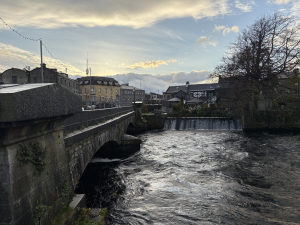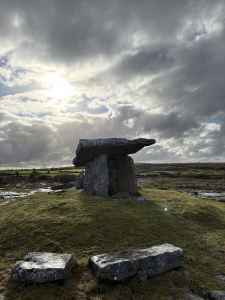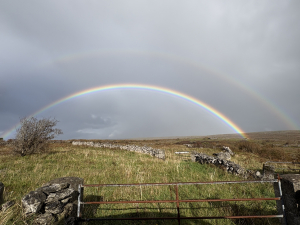Blog 6 – Pervading Perseverance
/in Limerick, Ireland Fall 2025 GilkeyGreetings friends!
Life is dynamic, ever-changing, shifting with the tide and often flitting between boisterous beauty and fickle frustration. It doesn’t feel like that long ago when I first arrived in Ireland, ready to take on the new things that were bound to be coming. But I am here. I have been here for a decent amount of time, and the things that I am learning and experiencing are arduous, but more fruitful and profound than I ever could have imagined. It all starts with a pinch of uncomfortability, a spoonful of optimism, a cup of prayers, and a conversation. Thank you for being here, in this moment, today, reading my blog. I pray that you can find a time for reflection as you consider how a particular moment has perhaps shaped you!
When endless amounts of things are going on, it can be easy to get distracted, stressed, anxious, and focus only on what lies in front of us. But there is loads more to life – not just our earthly life, but our eternal life. The world demands us to have overwhelming workloads, but things don’t have to be complicated. They are actually quite simple when we remember that Jesus completed the ultimate work for us – we must simply believe in Him! Look to the Lord with a grateful heart for the things you are the most thankful for! I urge you to find some gratitudes in your own life!
Three things I am grateful for:
- Letters (many of my friends and family compiled letters for me to open up while being abroad, and they always put a smile on my face and joy in my heart!)
- Forgiveness (not every day is a perfect day, but we have a perfect Savior who died on the cross and rose again for our sins, granting us forgiveness and everlasting life – thank you, Jesus!)
- Pilates (I have a yoga mat that I use to stretch and strengthen my body through pilates workouts, and I always feel relaxed and accomplished when moving my body in this way)
Conversations. Do you enjoy conversations with others? Or does it overwhelm you to have to think about speaking with another person, especially about an uncomfortable topic? Are you an introvert or an extrovert, primarily? What about talking with someone from a different culture? Does that change your answer to any of these questions? Think about it.
The prompt for my blog today pushed me to step outside of my comfort zone and talk with someone from another culture! Now I know what you may be thinking, “Uh, Katie! You live in a different country! You speak to people from other cultures daily!” If you are thinking that, you would be correct. Yes, I do speak with people from different cultures every day. But I decided to push myself a bit with the person with whom I spoke.
I am currently taking a class entitled “Aesthetic and Expressive Activities” (AEA), a physical education module focusing on how to teach gymnastics and dance to middle school-aged children. I love this class because of the content I get to learn, but I dread this class because of how uncomfortable I feel around my peers. None of them seem to enjoy gymnastics and dance very much, especially not to the level that I enjoy it. This causes a chasm of space to sit between myself and all of my peers. However, all of these people are wonderful Irish athletes who are smart and driven to teach children how to move their bodies. Ding, ding, ding! A commonality. I have a passion for movement…and so do they. I decided to have a conversation (more like an interview) with one of my AEA peers, Igor.
Igor is a charming man with a very unique background, which enables him to have a beautiful perspective on life. He and his family are Polish, but he grew up in English-speaking Ireland. His culture is mixed, and he would say that he has a “very different culture” from his home life, being primarily Irish. His story is fascinating, real, raw, and insightful. I pray you find joy in hearing about my takeaways from this conversation.
My takeaways:
- Small Towns vs. Big Towns
- Growing Up
- Education Systems
- Family Life
- My Own Epiphanies
Igor grew up on a farm in a very, very tiny place in County Leitrim, Ireland. The population in his village is only about 400 people! Think about that…the village that Igor grew up in has fewer people than the number of people that attend MLC! Crazy! He continued to explain that to get to a store, or anywhere for that matter, his family would have to drive forty minutes to an hour away, to a completely different county. I found this to be similar, yet different from the way towns are in America. Although New Ulm has always felt quite small to me, we have stores in town that are not more than a five-to ten-minute drive! But when I am living at home in Sparks, Nevada, there are certainly places close to home and other places farther away. For example, my doctors are on the other side of town – forty minutes from where I live! While Igor and I have different perspectives, we both have a forty-minute drive to a place we regularly visit. He drives that distance to get to another county for a store, and I drive that distance across one city to go to the doctor!
Growing up, Igor worked on the farm, played outside, did sports, and became fascinated with working with cars and mechanics. Like all children, he found ways to have fun, even if he had to be really creative to find things to do. But isn’t that refreshing? Our lives have shifted so much since the release of new technologies. It is at our fingertips, even at young ages. But how wonderful that Igor had the opportunity to experience a childhood that could promote experiential learning, motor development, curiosity, and imagination!
A very large part of Irish culture revolves around their Gaelic games (especially hurling and Gaelic football). Igor said, “growing up in Ireland, if you don’t participate in a certain sport, you can be seen as an outcast…to fit in, you nearly have to participate in some sort of sport growing up.” In America, I feel that there is lots of encouragement for children to participate in extracurricular activities in general – sports, dance, music, theater, etc. In Ireland, it is either sport or Irish dancing/traditional Irish music. Both countries value children gaining life experience through an outlet, but I perceive Ireland to be a country that has a very focused outlet to match with their cultural ideals of pride for their individual counties.
When it comes to education in Ireland, there are a lot of differences! One school that Igor went to broke the record for having the largest number of students in one year with 72 students! When he said this, I laughed because I thought about my middle school years when we had over 2,000 students in our school for only two years of schooling (seventh and eighth grade)!
Additionally, at the end of secondary (high) school in Ireland, all students must take a “Leaving Certification Exam” or “Leaving Cert.” The score that students receive on this exam determines much about their future. Each university/college, as well as each program at each institution, requires a particular number of points on the Leaving Cert. So, an individual can not even be considered for a particular degree program without a high enough score. In Igor’s case, he did not originally do well on his Leaving Cert, and he ended up pursuing an alternate route of education for a year. At this time, he grew as a person, and through a teaching experience with his former PE teacher, he decided that he wanted to become a physical education teacher himself! By completing this coursework and doing well, he was able to apply to the University of Limerick without his Leaving Cert score and has been successful in his program! His determination, perseverance, and resilience were really inspiring to listen to. According to Igor, many people think that the Leaving Cert is the “end all, be all,” but he says, “No! When there is a will, there is a way!” How empowering!
Through conversations with many different people, I have found that family life in Ireland is quite similar to America. For Igor, he is the youngest of six siblings. His siblings live all over Europe (Poland, Germany, England, and Ireland), and they very rarely have the opportunity to see one another. Similarly, depending on the situation and family, some families live spread apart across the United States and don’t often get to see one another either! Igor also had many pets (cats, dogs, etc.) growing up, a common experience among many American families. There are large families and small families in both countries, but when we really get down to the nitty-gritty, family is family, no matter the country or culture.
Something that I thought was refreshingly strange when talking to Igor was his complete surprise when I asked him to give me five fun facts about himself. He was so caught off guard that I would ask him to think about things about himself and share – I mean he really struggled for a little while. But it got me thinking, why was this such a hard question for him to answer? If someone asked me that question, I could easily come up with five things in less than five minutes. What is so different about him and me that would make a question of that sort challenging? I really don’t have a particular answer for you, but my thought is that perhaps it is a difference in cultural communication. In Ireland, they are incredibly indirect communicators and love telling elaborate stories. In America, we are much more direct in our communication, and we often ask questions like this during “icebreaker” conversations. We also really enjoy talking about ourselves, whereas I find less of that to be true in Ireland. Anyway, that was just a little silly goofy thought I had!
To finish my conversation with Igor, I asked him what his favorite thing about his home culture is. Of course, he considers his home culture to be Ireland, not Poland, but his answer was striking. He said that his favorite part about Irish culture is “how rough it is.” Wow. What are your thoughts on that answer? I can definitely tell you that I was not expecting him to say that, and I was wildly intrigued to know what he was going to say next! He explained that in sports, you are always “clashing with players” and “getting dirty all the time.” This kind of activity and way of being brought up “toughens you up.” At a young age, Igor would work on the farm, milk cattle, then go and do construction work, come home and finish with the cows at the end of a fourteen-hour workday. This physical labor was “rough” and “hands-on in a good way” as it “toughens you up as a person,” he said.
Igor’s tenacity, persistence, and determination have been flooding through his veins for his entire life. From the cultural differences between his family from Poland and where he grew up in Ireland to his village being far away from anything, his overcoming educational adversity to be at the University of Limerick, to his inspiring mindset on “roughness,”, he is a tremendous example for us all. We are only limited by our mindset…
Highlights of the past few weeks include:
- Galways’ Macnas Parade (we took a quick day trip to Galway to see their famous Halloween Macnas parade, filled with incredible art, costumes, and choreography)
- Accomplishing Big Assignments (I have been productive in completing many of my big assignments, which feels wonderful! Thank you, Lord, for giving me strength!)
- Conversations (I have had so many meaningful conversations with a variety of individuals – it fills my cup with joy to listen to others and share Christ’s love with them!)
- Pam’s Irish Dance Classes (Pam is one of my professors, and she needed an extra person in two of her Irish dance classes this past week, so I got the opportunity to Irish dance for four hours straight)
- Gilmore Girls (it is always a wonderful way to end the day or have a brain break when Nessa, Laura, and I watch an episode of “Gilmore Girls”)
Low-lights of the past few weeks include:
- Frustration
- Brain Fog
- Silly Buses
Learned Insights from the Low-lights:
- Frustration is a real and universal experience. It comes with the territory of being in communication with others and maintaining relationships. But it is such a blessing, if you really think about it. When one experiences frustration, it is a way of reflecting, emoting, and recognizing that a problem needs to be solved! It can be a tool for us to guide our next steps, and if one is frustrated with other people, it is a blessing that there are people in one’s life to be frustrated with!
- Brain fog. Another one of those universal experiences when our brains are on overload, are fried, and really can’t think very well. I have been experiencing quite a bit of this as I am doing my best to complete a lot of large projects. But again, this is a healthy tool that our bodies and brains give us to tell us that we need a break! We need to take a nap, drink water, eat, or move our bodies to refresh our brains once more!
- This past week, Laura and I went to shop for our groceries when we ran into a myriad of silly goofy bus issues. One bus driver wouldn’t let us on the bus, then we got on a bus going the wrong direction, then the driver took his break, then we got stuck in traffic, then he didn’t let us off at the stop we wanted, and then coming from the store, we missed the bus. There was every opportunity to be frustrated and upset with this situation, but Laura and I just completely accepted the wacky morning and laughed at everything! It made these unfortunate events so much more fun and a memory that I will forever hold in my heart! The next time something is happening that seems awful in the moment, I challenge you to embrace it with a smile, a laugh, and a good attitude. Nothing you do will change the current situation, but how you frame the situation with your mind can make all the difference!
Scripture that has helped me to persevere:
- 2 Timothy 4:7 – “I have fought the good fight, I have finished the race, I have kept the faith.”
- 1 John 2:6 – “Whoever claims to live in him must live as Jesus did.”
- Psalm 56:3 – “When I am afraid, I put my trust in you.”
These past few weeks have been crazy, busy, and full of many moments spent with God as I look to Him for strength. I pray that you continue to keep your eyes and your hearts set on the One who made you, cares for you, and who can guide you through adversity with grace. Continue to keep your heart filled with the love found in Christ’s death and resurrection, for He is our true source of perseverance!
May you ever be blessed,
Katie Gilkey
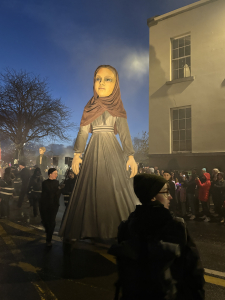
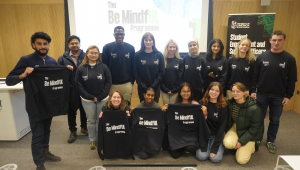

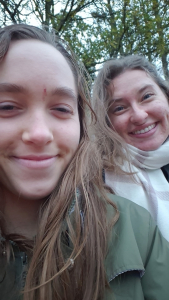
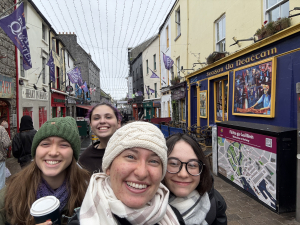
Grand VS Great; Ireland VS USA
/in Dublin, Ireland Fall 2025The prompt for this blog, have a conversation with someone from another culture and blog about what you learned, has got me thinking. Yeah, ok, Mathilde, that’s the point of a prompt… Obviously, I mean 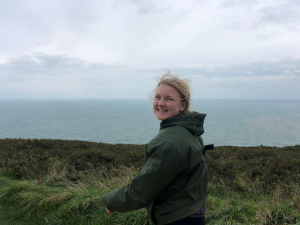 specifically about all the conversations that I’ve had, the scenes that I’ve observed, and all of the things that I’ve learned about different cultures during my time abroad so far. I’ve been mulling over this prompt for about a week, although some could call it procrastinating, and having it in the back of my mind has made me appreciate experiences that I have begun to take for granted. Two months ago, these differences were blinding, pushing me out of my comfort zone academically and socially. Needless to say, I did actually have a conversation with my Irish friend, geesh, I think we’ll just call her Mary, so I don’t out her, so the rest of this blog will include info from both overall observations about Irish culture and that conversation with my friend.
specifically about all the conversations that I’ve had, the scenes that I’ve observed, and all of the things that I’ve learned about different cultures during my time abroad so far. I’ve been mulling over this prompt for about a week, although some could call it procrastinating, and having it in the back of my mind has made me appreciate experiences that I have begun to take for granted. Two months ago, these differences were blinding, pushing me out of my comfort zone academically and socially. Needless to say, I did actually have a conversation with my Irish friend, geesh, I think we’ll just call her Mary, so I don’t out her, so the rest of this blog will include info from both overall observations about Irish culture and that conversation with my friend.
If you’ve been following along with my journey so far, you’re already familiar with some of these cultural differences, as they’ve been an overarching theme this semester. For that reason, I will try to not rehash things. Y’all already know that the Irish have an indirect communication style- classes start later than the appointed time, assignments are relaxed even though they are worth a large percentage of your grade, emails often get left for weeks before you receive a response-that has been a struggle for me to get used to. On top of that, it is often difficult for me to read situations. Most lecturers interact with their students during the class, yet they fail to really explain what is expected for their assignments. Classrooms are very relaxed, even to the point that often students just talk when their lecturers are teaching until the lecturer has to stop the lecture to ask them to stop. Another thing that I’ve noticed about Irish culture in general is how often and casually they swear. This week, during two different situations, class and student life run bingo, those leading the room casually threw out swear words. I honestly find it very entertaining and almost a relief. Although I find it unprofessional based on my previous life experiences and culture, I think their casual speech reflects their lighthearted culture, an aspect of Ireland that I didn’t necessarily expect but that I really enjoy.
Don’t mind me as I not-so-smoothly switch topics… just like I not-so-smoothly inserted a picture of me and my roommates back in September… One thing that has interested me a lot this semester is the Irish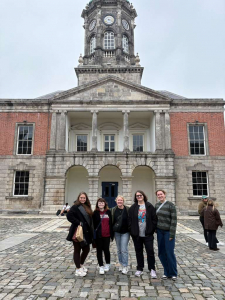 culture and its connection to the Catholic church. In my research before arriving in Ireland, I learned about their history, especially the age-long dispute between Catholics and Protestants. The Republic of Ireland is considered a Catholic nation, but when I asked Mary if she was Catholic, she said yes, but said that she only attends mass twice a year- Easter and Christmas- and doesn’t really believe what they teach. I’ve found that this is true for a majority of the Irish people I’ve met. Catholicism is a part of their heritage and culture more than it is something to which they actually subscribe. Mary said that the only member of her family who actually goes regularly is her gran. Because the religion is seen as a part of their history, many of my education lecturers talk about how the education system is too influenced by religion, seeing as the majority of primary schools are run by the church, and that we need to update the curriculum to escape the past. I am honestly not too shocked by this realization, as I feel that America is fairly similar. Many are not at all religious, and many who report as being part of a certain group also don’t attend church often, except on the “important days”.
culture and its connection to the Catholic church. In my research before arriving in Ireland, I learned about their history, especially the age-long dispute between Catholics and Protestants. The Republic of Ireland is considered a Catholic nation, but when I asked Mary if she was Catholic, she said yes, but said that she only attends mass twice a year- Easter and Christmas- and doesn’t really believe what they teach. I’ve found that this is true for a majority of the Irish people I’ve met. Catholicism is a part of their heritage and culture more than it is something to which they actually subscribe. Mary said that the only member of her family who actually goes regularly is her gran. Because the religion is seen as a part of their history, many of my education lecturers talk about how the education system is too influenced by religion, seeing as the majority of primary schools are run by the church, and that we need to update the curriculum to escape the past. I am honestly not too shocked by this realization, as I feel that America is fairly similar. Many are not at all religious, and many who report as being part of a certain group also don’t attend church often, except on the “important days”.
I’m not sure if I’ve already talked about this or if it is just fairly obvious, but I am continually surprised by the emphasis that Irish culture puts on enjoying life. In the States, people may feel like they’re working so that they can enjoy life, but people here enjoy life and also work. During orientation, the person speaking to us told us that studying is important, but don’t forget to take advantage of our time to make friends and have fun. Because we have so few assignments, we actually do have time to socialize and enjoy life, while I feel like back home, we are told to prioritize academics, and people’s schedules are so full that they don’t really have a choice. Here, it is perfectly acceptable to go out on a weeknight and not just on the weekends. There’s even a bar on campus where they hold events, you can get cheap food and drinks, and there’s plenty of space to hang out inside and outside the building. All around the country, there are student discounts or student nights, even though going to college here is very inexpensive, especially as compared to the US. Many students don’t work, and, if they do, they work on weekends when they go home, which would unfortunately not cut it for me financially at home. Without your parents’ help or other grants, it is very difficult to get through college without loans in the United States, a fact that shocks all the Irish students that I’ve talked to. Please enjoy the beautiful flowers, one of the things that I enjoy during my free time walks : )
Geesh, this blog is kinda feeling like a school report right now. All observations, nothing too exciting, so I figured I would dedicate the rest of the blog to life updates from yours truly. Per usual, self-motivation is difficult, and I fear that I am a raging procrastinator, as I stated earlier. Healthy habits are like an old car. Some old cars may take a little bit of effort to start, but will continue to run after the initial push, while others are hard to start and are difficult to keep running. I’ve been doing better about my 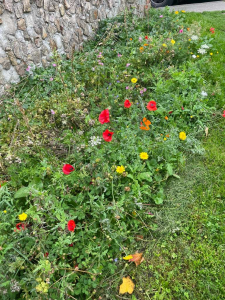 subconscious praying because it is genuinely the only thing that will calm my body down so that I can sleep at night. After this semester of sleep troubles, my pillow at home goes into the same boat as my car- something that I will never underappreciate again. Anywho, I’ve started to focus more on physical activity as the days start to get dark by 5:30. I find that, like most people, my mood goes down with the sun, and my body calls it quits as soon as the sun does. As an attempt to combat this and also take advantage of some of my ample free time, I purchased a cheap yet effective watercolor set from the seasonal aisle at Aldi, and I have started a new hobby. I find painting very relaxing, even during the brief period of time when I was finger painting due to my lack of brushes, and I’m even finding myself admiring some of my own work. While I’ve always had difficulties acknowledging my talents and being proud of myself, I think that this newfound hobby is good for my brain and is helping me to value myself and my abilities. Any other news…? Huh, well, can we just talk about how easy it is to put cleaning on the back burner when you are the only one using a space? As much as I really appreciate clean floors, I have vacuumed my room once this semester, and that’s only because my flatmate had one that she had borrowed from the office and offered to me. I have also mopped my bathroom once this semester… are you sensing a theme? Doing the bare minimum to get by and not be disgusting. Yeah, it may sound gross, but believe me, it’s really just fine… I think. Ok, stop judging me.
subconscious praying because it is genuinely the only thing that will calm my body down so that I can sleep at night. After this semester of sleep troubles, my pillow at home goes into the same boat as my car- something that I will never underappreciate again. Anywho, I’ve started to focus more on physical activity as the days start to get dark by 5:30. I find that, like most people, my mood goes down with the sun, and my body calls it quits as soon as the sun does. As an attempt to combat this and also take advantage of some of my ample free time, I purchased a cheap yet effective watercolor set from the seasonal aisle at Aldi, and I have started a new hobby. I find painting very relaxing, even during the brief period of time when I was finger painting due to my lack of brushes, and I’m even finding myself admiring some of my own work. While I’ve always had difficulties acknowledging my talents and being proud of myself, I think that this newfound hobby is good for my brain and is helping me to value myself and my abilities. Any other news…? Huh, well, can we just talk about how easy it is to put cleaning on the back burner when you are the only one using a space? As much as I really appreciate clean floors, I have vacuumed my room once this semester, and that’s only because my flatmate had one that she had borrowed from the office and offered to me. I have also mopped my bathroom once this semester… are you sensing a theme? Doing the bare minimum to get by and not be disgusting. Yeah, it may sound gross, but believe me, it’s really just fine… I think. Ok, stop judging me.
Now that I’ve gotten all of that off my chest, I think that it’s time to pull a Houdini while I contemplate whether or not it was a good idea to air my own dirty laundry like that…
Peace and love!
Mathilde
Getting to Know Vittorio
/in Berlin, Germany Fall 2025 MunsonThis last weekend, I traveled to Brussels, Belgium! I really wasn’t expecting a lot from Brussels, but the city was beautiful and, for someone who loves architecture, it was cool to walk around the old parts of the city. As I was alone on this trip, there was so much that made me grow as a person while I continued to step out of my comfort zone. For example, eating at a restaurant by yourself in a foreign country where you can’t read the menu is something I feel that pushes me to grow as a person, and you end up with great food 🙂
My main objective of the weekend was to go to the International Brussels Tattoo Convention. I already had an appointment with my favorite tattoo artist, but on the second day of the convention I decided to also get a tattoo from this artist from Italy. His name was Vittorio, and I had admired his work as I walked past his booth the day before. On the next day, I decided to ask him if he had time to tattoo me. He said yes, and I got an amazing tattoo from him. During the tattoo, we also got to talking. Vittorio is a little older than me, 25. He comes from a very small part of Italy in a southern region of the country. We talked about life and how he ended up here tattooing, and how I, an American ended up in Europe getting a tattoo at the International Brussels Tattoo Convention. Long story short, we ended up talking so much that he invited me to have a beer with him after the tattoo. As we sat and talked after the tattoo, I asked him about how he became a tattoo artist. It turns out that the Italian education system is much different than the American system! Instead of offering many different programs at universities, in Italy each university specializes in one specific thing, and so Vittorio decided to pursue art. After that, he got into tattooing and has been doing it ever since. I thought it was so cool that he’s been able to travel all over Europe because of it. Vittorio has also never been to America and so he was very curious about what it was like. I shared mainly what the education system was like, to which he had many questions.
We also talked about transportation, Italy is not like Germany which has a good train system. It is similar to America where many people drive; however, people in Italy have to wait longer to get their licenses, and it is often harder to obtain with more of a focus on driving theory.
Throughout this whole encounter, I kept thinking how awesome it was that I got to be there in that moment getting to know Vittorio. A parting word of knowledge that I gained from this trip, everyone has a story to tell. Get out there, and get to connecting with people. There’s a world full of friends to make 😉
Tschüss!
(Below is a picture of what the Tattoo Convention looked like and a picture of one of the amazingly beautiful churches in Brussels.)

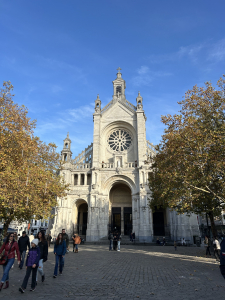
Quito: The First Two Months
/in Quito, Ecuador 2025Hello! My name is David Fenske, and I work as a missionary assistant with Academia Cristo in Quito, Ecuador. For those who do not know, Academia Cristo is an organization supported by the WELS dedicated to sharing the gospel and training church planters throughout Latin America. Most instruction is done through applications like WhatsApp and Zoom, which aim to spread the gospel to as many people as possible.
It is challenging to know where to start when telling your story. The path to how I ended up in Ecuador is long, winding, and full of twists and turns. After some reflection, I believe the best place to start is at the end of my time studying abroad in Ireland (you may have read some of those blogs!). So here’s what’s happened since I finished my time in Ireland in April of 2024:
- I studied Spanish literature in June of 2024 in Buenos Aires, Argentina.
- I returned to New Ulm and spent July and August of 2024 working as a line cook at the New Ulm Country Club.
- In August 2024, I began studying on the Pastor track at MLC. I fell in love with the Biblical languages and, much to the chagrin of my friends, I spent most of the school year studying in the library.
- In December 2024, I was recommended to look into being a missionary assistant with Academia Cristo. I figured it would help me with my Spanish, so I applied, interviewed, and got the job.
- I finished the second semester in May 2025, and after a week at home, I returned to Buenos Aires for my third Spanish immersion trip. I had the privilege of taking an intensive Spanish literature course with Profe Bases. We read about 50 pages per day and covered various authors, genres, and themes.
- When that ended, I spent a week as a tourist in Panamá City before I went to Antigua, Guatemala, and studied a Mayan language called Tz’utujil for six weeks. I could write forever about the experience, but suffice it to say, I now have an intermediate knowledge of a language that only 72,000 people speak in five towns on the shores of Lake Atitlan.
- I was able to return home for two weeks, spend time with family, and then I flew down to Quito on September 1st.
Now that we’ve breezed through the past year and a half of my life, we can talk about how my first two months in Quito have been. I would like to say that it’s been all sunshine and daisies in my first two months, but it hasn’t.
I was welcomed and made to feel like I was a part of the missionary team from the very beginning. However, I had a severe reaction to the altitude and felt a general malaise for the first week. Then, right as I was adjusting to the altitude, I got sick again, this time with a bacterial infection of some sort. I think I got it from some spoiled ceviche– I haven’t felt so ill in years. My symptoms were so bad that I went to the hospital (see the photo below). Fortunately, I recovered within a few days and felt healthy enough to go hiking in Cotopaxi with a group of students.
Cotopaxi was unbelievable. We started our day with an hour-long hike to a base camp at around 5,000 meters (16,400ft). When we reached the base camp, I randomly made small talk with an Israeli who was very impressed when I bellowed the Shema. Unsurprisingly, he asked me how and why I knew it, which led to an opportunity to explain that I am studying to be a Lutheran pastor. Like most people, he asked, “What’s a Lutheran?” So I was able to share what I and other Lutherans confess about the gospel message, all because I had memorized Deuteronomy 6:4 in the original Hebrew. After some time at the base camp, my group and I descended, and we could ride mountain bikes most of the way down. All in all, it was an excellent day.
However, homesickness didn’t take long to hit me like a freight train. A few days after Cotopaxi, I moved from the homestay I was at to a missionary family’s home. The missionary family happened to be going home to the US for two weeks. Then they went on a work trip to Colombia, so I watched their house and dogs for three weeks. I was happy to do it, and I didn’t mind the company of the dogs, but I spent too much time in isolation, so my homesickness started to spiral. Things didn’t get any better when I moved into my own place after the three weeks had passed. It’s embarrassing to admit, but I’m not the independent, autonomous person I sometimes try to be; I need social interaction and conversation with others.
Fortunately, Profe Bases came and visited me (and some of his Ecuadorian friends). We were able to spend plenty of time together. We had long conversations, did tourist activities, and enjoyed meals together. He reminded me of why I came to Ecuador in the first place: to continue improving my Spanish. His encouragement helped me to explore the possibility of taking Spanish classes here. I’m in the registration process and hope to start taking daily classes at a Spanish institute near my home starting next week. His encouragement also helped me seek out social interaction, so I reached out to my former host Mom, and we got dinner last Friday with some other students she’s currently hosting. It was an amazing opportunity to eat with them because I was able to share the gospel with them. Believe it or not, explaining that you’re studying to be a pastor quite easily leads to conversations about God. In my experience, most people walk around with unanswered questions about God and eternity. So, when non-Christians meet a Christian, they’re eager to learn what it’s all about. This lends even more credibility to the importance of 1 Peter 3:15, “Always be prepared to give an answer to everyone who asks you to give the reason for the hope that you have.”
You may be wondering what I do with my time. My work with Academia Cristo is part-time, so I only work about 15-20 hours per week. I consider myself the “loose-ends” guy because my work varies significantly from week to week. Sure, I have some student data entry responsibilities that remain a daily task, but otherwise, I take care of odd jobs here and there. I’ve house/dogsat, cleaned the office, helped communicate with students, helped lead devotions with the missionaries, and taken notes during missionary meetings, among other things. But the 15-20 hours of work leave me quite a bit of free time, so I’ve had to be intentional about how I use my time.
I spent my first six weeks in Ecuador reviewing Greek and Hebrew grammar, and now I’ve started translating through the books of Luke and 1,2 Samuel. I’m far from an expert, but I’m amazed at how much I can understand, especially considering that I didn’t know either language until 14 months ago. If that wasn’t enough language work, I am teaching myself Latin. Latin isn’t hard, mainly because the vocabulary is very similar to Spanish and the grammatical structures are nearly identical to Greek. This means that I use five different languages almost every single day. When I’m not studying languages, I’m spending my time writing. I’m currently working on a book about biblical interpretation. Perhaps I will share more about that in the future. I would be remiss if I didn’t mention that I’ve kept up my voracious reading habits; I’ve read or finished reading 16 books in the past two months. However, when I’m not being a nerd, I work out. I lift weights two days a week and run three days a week.
Finally, my favorite time every week is when all the missionaries gather on Sunday mornings to join in worship. Because there is no church here, we gather in one of the missionary families’ homes. The services are an interesting blend of Spanglish. For example, the liturgy is usually in Spanish, the Scripture readings and sermon are in English, but the hymns/songs are a healthy balance of both. It has also been an incredible blessing to take communion with the missionaries.
It has been a pleasure to give you some insight into what has been going on in my life– thank you for reading! I ask that you pray for the gospel’s spread as Academia Cristo seeks to play its part in fulfilling the Great Commission. May God bless you!
David
An explanation of the photos:
- My first hospital visit in Ecuador
- Hiking the Cotopaxi Volcano
- Standing on the Equator
- Yo y mis viejitos
- Church with the missionaries and their families
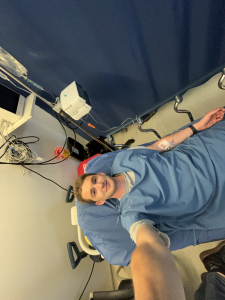
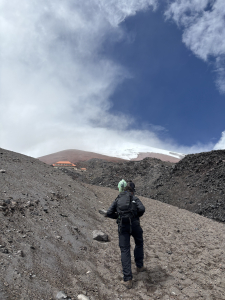
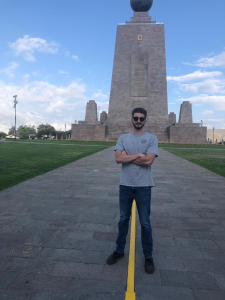
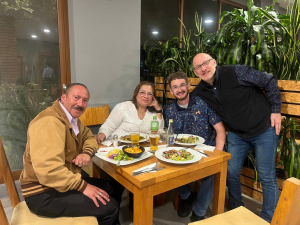
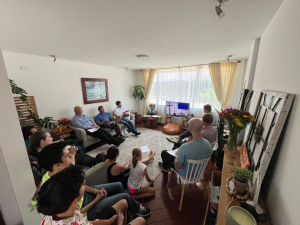
Blog 5 – Joy in Jesus
/in Limerick, Ireland Fall 2025 GilkeySmiles, my dear friends!
Smiles indeed! I must say that this past week has brought me many, many moments of smiles, prayers of thanks, and joy in Jesus! It is hard to believe, but this blog marks the mid-point of my time in Ireland – I have just about two months left! My time here has been immeasurably blessed, and I can joyously say each morning, “This is the day the Lord has made, let us rejoice and be glad in it” (Psalm 118:24). Thank you for reading this today, and I pray that you are finding ways to be joyful in your own life!
One of my favorite parts of my day is when I give gratitude and pray with my boyfriend, Micah! We share the things that we are grateful for in the day, prayer requests that we have for ourselves and people that we know, and then we pray together! It is such a blessing to be able to find the good in such a broken and sinful world – God is good and therefore there is no shortage of amazingly good things to find through gratitude! Here are some of my “gratitudes” from these past few weeks!
Three things I am grateful for:
- The Kopplin Family (Laura’s parents came to visit, and they invited me to come along on their adventures – they are the absolute sweetest!)
- The North Wild Atlantic Way (with the Kopplins, we drove this coastal route along the ocean and saw some magnificent sights – the juxtaposition of green hills and rocks with blue water and sand is a tremendous sight to see!)
- God’s Strength (there have been a few different moments this past week where God gave me the opportunity to talk to people about Him – He gave me strength and the right words to say when sharing His glorious Gospel message!)
For this blog edition, I have been tasked with answering four main questions regarding my experience thus far. I have so many thoughts as this marks the halfway point of my adventure!
- How do you feel about your experience so far? Why?
- I feel blessed!
To be honest, many people have asked why I decided to come to Ireland, and I really don’t have a precise answer to give them! One morning in my Freshman year at MLC, I woke up and felt really called to study abroad. Three years later…and here I am! In the back of my mind, I have always felt sure that there is a reason that God wants me here, in Ireland, at this particular time. Why? I don’t know, but I am certain that God is using me in His will. I couldn’t be happier to be in a place where I can learn, grow, and flourish in ways that wouldn’t be possible in my home country.
This experience so far has been blessed in every possible way. God has allowed me to meet new people, make connections, learn a wide range of academic ideas, volunteer for societies and organizations on campus, work on building better personal habits to care for my well-being, and most importantly, share the light of Jesus with others! The depth of perspective that I am gaining from individuals around the world is astounding! I feel myself becoming more aware and compassionate towards others by valuing how they see the world and recognizing that every person walking around me was made by God! Jesus loves them, forgives them, died for them, and wants them to be saved!
2. Which goal have you made the most progress on?
- To have a basic knowledge of Irish music and dance.
Well, friends, I can safely say that I will be coming home with a very decent amount of knowledge in the world of Irish music and dance. I have learned loads about the history of Irish dance, explored traditional musical instruments (and how they are played), and drilled the practical components of how to dance a variety of Irish dances! I am being spoiled this semester…hehe! I have classes that are mandatory for me to go to and consist of me doing my favorite thing on the face of the planet…dance!!! 😀
However, may I say, Irish dancing is far harder than it looks! The control needed to keep your upper body stiff and yet move your lower body with such precision is undoubtedly an art! There is also a sense of rhythm that is quite demanding in Irish dance. I find myself at times getting lost in the syncopation of beats because the footwork is about how many different steps or sounds you can accomplish in one beat of music, not dancing to each beat of the music individually. For any of you who know me really well, I actually have the worst time with rhythm – I always have, even from when I was little. I used to get yelled at when I was at dance because I could never count the music very well…ironic, isn’t it?! 😅 Needless to say, not only am I really working hard on learning new moves, but I am focusing SO hard on the rhythm of the dancing that I bet I sweat double the amount necessary!
Anyway, I am super excited because at the end of the semester, I have the opportunity to do a mini performance with each of my dance classes! In my Ceili dance class, our class will get to perform two different Ceili festival dances that we enjoyed. In my Irish Dance Performance Skills class, we are collaboratively creating a dance! All but two of us in the class are dancers of other genres, but have never Irish danced before. We decided on a theme for our dance – Irish Traditional Dance vs. Contemporary. We are having a hoot blending Irish trad with the emotional and fluid complexities of contemporary dance! Dance is about expression, interpretation, imagination, and creativity within the confines of movement – it is brilliant because there is never only one way to dance. The idea of what dance is can be pushed, and the boundaries are endless as long as the body is in motion. What a gripping thought!
3. What are the three areas that you can improve on for the second half of your time abroad?
- Comfort zone
- Group Work
- Balance
Though I have made a ton of progress in becoming more comfortable with the uncomfortable, there are still some areas that I want to explore to feel accomplished. At the moment, my comfort zone includes traveling around Ireland with others and alone, going on spontaneous adventures, and living on my own (though my housemates and I do most things together). I would like to continue to push myself and travel outside of Ireland sometime soon! Navigating the bus system in Ireland is normal at this point, but I want to seek the challenge of having to figure out a different culture’s transportation system to enjoy new places! I would also like to push myself and, at least one time, go to a pub in the evening to see what their nightlife is really like. It is not my cup of tea to be in a location of such sorts at night with alcohol around, but I do feel like it is my due diligence to understand their culture and what is considered “craic” to the Irish people!
At the moment, I have five group projects lined up with a variety of my classes, and I am struggling. I find that the communication style here is quite indirect compared to my own direct communication style, so I easily get frustrated when people do not reply in regards to getting work accomplished. I like to be organized and proactive in completing tasks, but I am unable to do such work until I have people who are willing to work with me. As I continue to reflect on these experiences, I am going to make a conscious effort to acknowledge how other people prioritize their time. I pray that through this shift in perspective, I will stay positive and calm when working cohesively with many different teams…leading me to feel adept at working in groups with people from other cultures, communication styles, and with different perspectives.
I can definitely continue to improve the balance in my daily life. From classes to school work, devotions to reading, and naps to watching “Gilmore Girls”, I do a vast array of things in a given day. As of now, I have created some lovely habits, including: morning and night devotions, reading, journaling, working out, more sleep, getting a good breakfast in the morning, and resting in the evening (watching “Gilmore Girls” or playing sudoku). I am really happy with my progress thus far! At home, none of these things would have ever occurred on a regular basis, so I am thrilled that my days are filled with such activities! But at this point, I would like to take these activities and put more realistic time restraints on them so that I can have better time management, but still take time to live in the moment! I definitely feel like I am succeeding in many of my goals, but I think that I could do an even better job of being a good steward of the time that God has graciously given me!
4. What has surprised you about the culture of your host country? What have you improved on? How have your opinions evolved?
- How much they care for their environment.
- Giving myself grace.
- I miss aspects of American culture.
From the moment I arrived in Ireland, it was evident how conscious the people of Ireland are about the environment. There is not a lot of trash anywhere outside, rubbish bins are few and far between, they sort their garbage into waste, recycling, and compost, they don’t use paper towels, and they have a huge emphasis on reusable materials. These are just a few of the many examples that I see on a daily basis of how they strive to care for the environment that God has blessed them with! I know that I will be much more aware of how I am recycling and disposing of materials when I go home!
I am really pleased with my progress while being in Ireland! All of the goals that I set for myself are most certainly being reached and continuously worked on as I adjust to a different culture and put more focused time into improving my mental, physical, spiritual, and emotional well-being. One thing that I have greatly improved on is giving myself grace. I am a perfectionist by nature, and I have always struggled when things didn’t work out exactly the way I intended. I don’t know about you, but I like to have control and to know that when things are complete, they are completed with the best quality possible! Here, I don’t have control. I have to rely on learning the ways of others, going with the flow, and just doing the best that I can in a given moment! This is really becoming an area of growth for me, particularly in my group projects. I know that I have previously touched on that, but I am learning to have grace with myself when people don’t respond right away, and I can’t complete my work when it is convenient for me. This is not my problem or their problem. This is how the culture is – full of indirect communication, which is neither right nor wrong – just different. Therefore, there are many times that I say a quick prayer and surrender my frustrations, worry, stress, and anything else on my heart and mind to God! I trust that God is helping me grow through these tedious moments of surrender.
The first few weeks I was here, many people asked me, “How are ye finding yourself?” I am not sure what is going through your mind right now, but I can certainly say that I was a bit confused by that question. Like, what do you mean “how am I FINDING myself”?? I found myself in Ireland, and it is beautiful! But no! They were really asking me, “How are you doing? How is Ireland?” Oh! Well, with that tidbit of golden knowledge, there would have been a lot fewer awkward moments at the start of this adventure! Once I figured that one out, my answer looked a bit more like this: “Oh my, I love it here! The land is gorgeously green, and the people are so kind! I would move here, if I could!” Interestingly, many people gave me curious looks when I said that I would move here. Apparently, they don’t see the beauty of the place they live. But isn’t that true for all of us? It is really hard to see the blessings you are given when you are always surrounded by them. Sometimes it is healthy to take a step away from what is “normal” and look with a fresh, outside perspective to see the absolute love that God has bestowed upon us! This couldn’t be more true for me right now. I want you to know that I still adore Ireland, but I do think my answer has changed from the beginning. I don’t think that I would want to move here after all.
Think about your favorite season or time of year. What makes it your favorite? What smells, tastes, and vibes give you that feeling of excitement and joy that you wait all year for? For me, September through December is undoubtedly my favorite time of the year. I love the fall, the drinks, snacks, and homey feeling that comes with fall into Thanksgiving into Christmas! While I am not feeling homesick, my feelings at the moment would be best described as feeling culture sick. Ireland does not engage in all of these fall moments like America does. Partly because they don’t celebrate Thanksgiving, the feelings that I wait all year for in America are not the feelings that I am experiencing. This is not a bad thing, it is a different, new experience that I am blessed with! I am just really thankful to call America home. With a fresh perspective, I think that I will not take the specialness of fall into Thanksgiving into Christmas for granted, ever again!
Highlights of my many days include:
- The BeMindfUL Programme (there have been some amazing insights, and I have been blessed with the opportunity to share the Gospel message with a lovely gal)
- The Cliffs of Moher (it has always been my dream to go there and they are STUNNING – also, many movies have been filmed there and I got to see the “Cliffs of Insanity” from “The Princess Bride” – hehe 😁)
- Killarney National Park (I took a trip to Killarney and hiked around the National Park for a wee bit – it is absolutely beautiful)
- Pilates (I try to do it once a day, and it makes me feel so rejuvenated)
- Chats (I have been having so many chats with friends and Professors, and I always feel a surging rush of joy getting to talk with people who give such good perspective)
- Bible App (I started doing more daily devotions, and I am feeling God’s love and power in such intense ways – He is so good)
Low-lights of my many days include:
- Anxiety
- Time Management
- Missing People
Learned Insights from the Low-lights:
- My counselor always says, “Katie, anxiety is a control disorder. You need to surrender to God.” Boy, isn’t she right?! That is exactly what I explained earlier: I am a perfectionist, and I want control that I can’t have, so it causes me to feel anxious. But she is also spot on. God is the only one who is and can ever be in control. I must continue to learn to surrender to Him and give myself grace in the process. God says, “Cast all your anxiety on Him because He cares for you” (1 Peter 5:7).
- Due to the fact that the time I have here is more loose than it would be in America, I find myself wasting time every so often. But then I get upset with myself that I didn’t use my time as wisely as I could have. The difference is that Ireland is more of a “being culture” than America is. America is a “doing culture,” and it is a strange adjustment to make, having more time than normal. Having more time is an absolute blessing, and I am going to continue to do my best to make the most of it, give myself grace, live in the moment, and pray for motivation to complete the tasks that I need.
- I find myself missing the familiarity of home and people that I would typically see on a regular basis! I am not homesick, but I definitely miss my friends and family, and I think about them all the time! This is such a blessing that I have so many people that I love so dearly that I can have this feeling of “missing”! When I do have the opportunity to reunite with everyone, there will be endless joy – just as there will be endless joy when we come together and meet our Creator in heaven someday!
Scripture that has been close to me these past weeks:
- Judges 6:12 – “When the angel of the Lord appeared to Gideon, he said, ‘The Lord is with you, mighty warrior.’”
- John 6:35 – “Then Jesus declared, ‘I am the bread of life. Whoever comes to me will never go hungry, and whoever believes in me will never be thirsty.”
- Matthew 9:37-38 – “Then he said to his disciples, ‘The harvest is plentiful but the workers are few. Ask the Lord of the harvest, therefore, to send out workers into his harvest field.’”
My dear brothers and sisters in Christ, these are all of my thoughts, reflections, and things that have been on my heart and mind! I pray that God continues to bless you immensely and that you can look to God in everything you do! Not every moment of life can be happy, but every moment can be joyful because you have been given the gift of forgiveness and salvation by your Savior! Rest in the joy of Jesus!
Blessings,
Katie Gilkey

